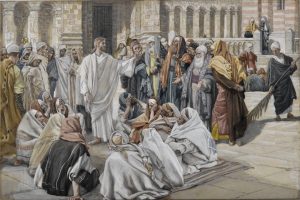HOMILY LENT WEEK 05 03 – Year II
A Critical Decision
(Dan 3:13-95; Dan 3:52-56; Jn 8:31-42)
***************************************
Perhaps you have heard this tongue in cheek saying, “The truth will set you free, but first it will make you miserable.”
A disciple is a life-long learner, a “mathetes,” someone who seeks the truth, and strives to be a carbon copy of the master. We are invited be disciples of Jesus, place our faith and trust in him, express our faith through generous sharing, and live the truth in freedom.
The readings today put forward two conflicting paths: to follow Jesus, who is the truth, or choose to be like the Pharisees, and fall into untruth. In the gospel, Jesus struggles with the Pharisees who refuse to believe in him. Jesus invites them to believe in him who is the truth sent from God; to have his Word within them, to be his disciples and follow him, and to ultimately find deep freedom in so doing.
The Pharisees, however, commit the most serious sin for Jesus, which is to refuse to believe in him. It is interesting that this stance means they do not have the Word of Jesus in them either, they who were convinced that they were following the law of Moses. Not only were they not really following that law, Jesus points out that they are not really children of Abraham either, or they would believe in him.
Ray Dlugos, director of a therapeutic centre for clergy in the States, teaches that there are only two kinds of sin: to try to be more than human, or to be less than human. To be more than human is to be full of false pride, to live in our heads, to ignore our emotions, to lust after power and control, to think that we are better than others. That is truly the sin of the Pharisees.
To be less than human is to give up and give in, to not care anymore, to let it all hang out, to live a life of dissipation. In a way, that is also the sin of the Pharisees – who gave themselves over to luxury, status and comfort. They were falling for the false gods of possessions, prestige and power – and in the end were committing idolatry, although they were totally oblivious to that fact.
 What a stark contrast to their ancestors in the faith, Shadrach, Mesach and Abednego in the first reading, whose faith in the one God of Israel was so strong, they were ready to die rather than worship the golden calf made by the pagan king Nebuchadnezzar. Whether they were saved from the fierce fire or not, they were ready to sing God’s praises, and as we see, God heard their prayers of praise and rescued them from the flames.
What a stark contrast to their ancestors in the faith, Shadrach, Mesach and Abednego in the first reading, whose faith in the one God of Israel was so strong, they were ready to die rather than worship the golden calf made by the pagan king Nebuchadnezzar. Whether they were saved from the fierce fire or not, they were ready to sing God’s praises, and as we see, God heard their prayers of praise and rescued them from the flames.
It is easy to pray and sing praises to God when things are going well in our lives. These three young men model for us a faith that stands firm and withstands the hard knocks of life. It is that kind of faith that is called for now in the midst of the post Covid-19 crisis, when many people, couples and families find themselves with a limited income and facing rent or mortgage payment increases. Instead of panicking, can we trust that God is with us in whatever situation we may find ourselves in?
This crisis is also a clarion call to those who are enjoying financial security, to consider reaching out to those less fortunate, and to express their faith by sharing that wealth with those who are on the brink of despair and see no way out of the hardships imposed on them by this totally unforeseen and unprecedented crisis. This may be the best use ever for that wealth that helps no one when in bank vaults or portfolios.
The choice presented by these readings is clear. Let us be totally human; put our faith in Jesus; focus on his Word, get to know him better through prayer, experience his love through the Eucharist, express our faith by trusting in him, share generously with others, and experience the freedom from slavery to sin that he alone can give us.



